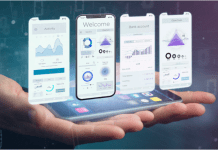How Do You Define Mobile Application (Mobile App)?
An application for mobile devices, more commonly known as an app, is software that runs on smartphones and tablets. In many cases, mobile applications provide users with similar services to PC applications. A mobile app is generally a small piece of software that performs a specific function. Thousands of Mobile applications for iPhones, iPads, and iPod Touch can be downloaded from Apple’s App Store, which Apple Inc popularized.
There are many names for mobile applications, including web apps, online apps, iPhone apps, and smartphone apps.
Is There a Difference Between the Types of Mobile Apps? What is the best way to choose?
Types of Mobile Apps
The question of which type of mobile app to build for your business will inevitably arise for anyone building an app.
CrystalXone may have a web or hybrid app, or you may read about other brands that built their native app from scratch. How do these terms relate to each other?
To assist you in making an informed choice, we will discuss the advantages and disadvantages of each type.

Technology-based types of mobile apps
Based on the technology used to mobile code apps, there are three basic types:
Apps native to one operating system or platform are known as native apps.
Web apps work on every mobile device and operating system using a mobile browser.
Hybrid apps are a combination of native and web apps wrapped within a native app, which can be downloaded from an app store or have its icon.
Native Apps Native apps are designed specifically for a mobile device’s operating system (OS).
Therefore, you can create native Android or iOS mobile apps and apps for various other platforms and devices. It’s not possible to mix and match these apps. For example, use a Blackberry app on an Android phone or an iOS app on a Windows phone.
Various programming languages are used to develop native apps. There are several examples of these programming languages: Java, Kotlin, Python, Swift, Objective-C, C++, and React.
Native apps are faster and more reliable because of their singular focus. Mobile apps of this type are generally more resource-efficient than other types. With native apps, users get a more optimized experience using the built-in device interface.
Apps built on native platforms have access to many device features, such as Bluetooth, phonebook contacts, camera roll, and NFC, because they directly communicate with the device’s hardware.
Native apps
Native apps have the drawback of having to duplicate efforts for each of the different platforms if you start developing them. It is not possible to reuse code created for one platform on another. The cost of this increases. In addition, maintaining and updating the codebase for each version takes time and effort.
The user must download and reinstall the app every time it is updated. Additionally, native apps eat up space on your device.
Web Apps
A web app behaves like a native app on your mobile device but is accessed through a web browser. As far as downloading and installing code into your machine is concerned, they’re not standalone apps. In reality, they are responsive websites that adapt their user interface to the user’s device. A web app is often simply a bookmark of the website URL when you see the option to “install” it.
PWAs, native apps embedded within browsers, are one type of web app.
HTML5, CSS, JavaScript, Ruby, and similar programming languages are used to develop web apps.
It does not require customization to a platform or OS because it’s web-based. Costs are reduced as a result.
Furthermore, there is no need to download anything. The update will be pushed live via the web, so your device memory will not be taken up by native apps. App store users do not need to download the update.
However, this is also important to note:
web apps entirely depend on the browser used on the device. Users may experience varying experiences based on the functionality of one browser but not another.
Since they are shells for websites, they will not work entirely offline. The device still requires an internet connection even if it has an offline mode to back up data, offer new data, or refresh the screen.
Hybrid Apps
Hybrid apps fall into this category. A web app that looks and feels like a native app. Even though they look like native apps, they’re web apps made to look native. They might have home screen icons, responsive designs, fast performance, and even be able to function offline.
Hybrid apps combine web technologies with native APIs. Ionic, Objective C, Swift, HTML5, and others are the technologies used in their development.
An advantage of hybrid apps is that they can be built more quickly and at a lower cost than native apps.
Therefore, hybrid apps can serve as the minimum viable product – a test of the viability of native apps. Additionally, they load rapidly, are ideal for countries with slower internet connections, and provide a consistent user experience. In addition, they need to maintain much less code since they use the same code base.
One of the cons of hybrid apps is that they might not have the power and speed of native apps.



